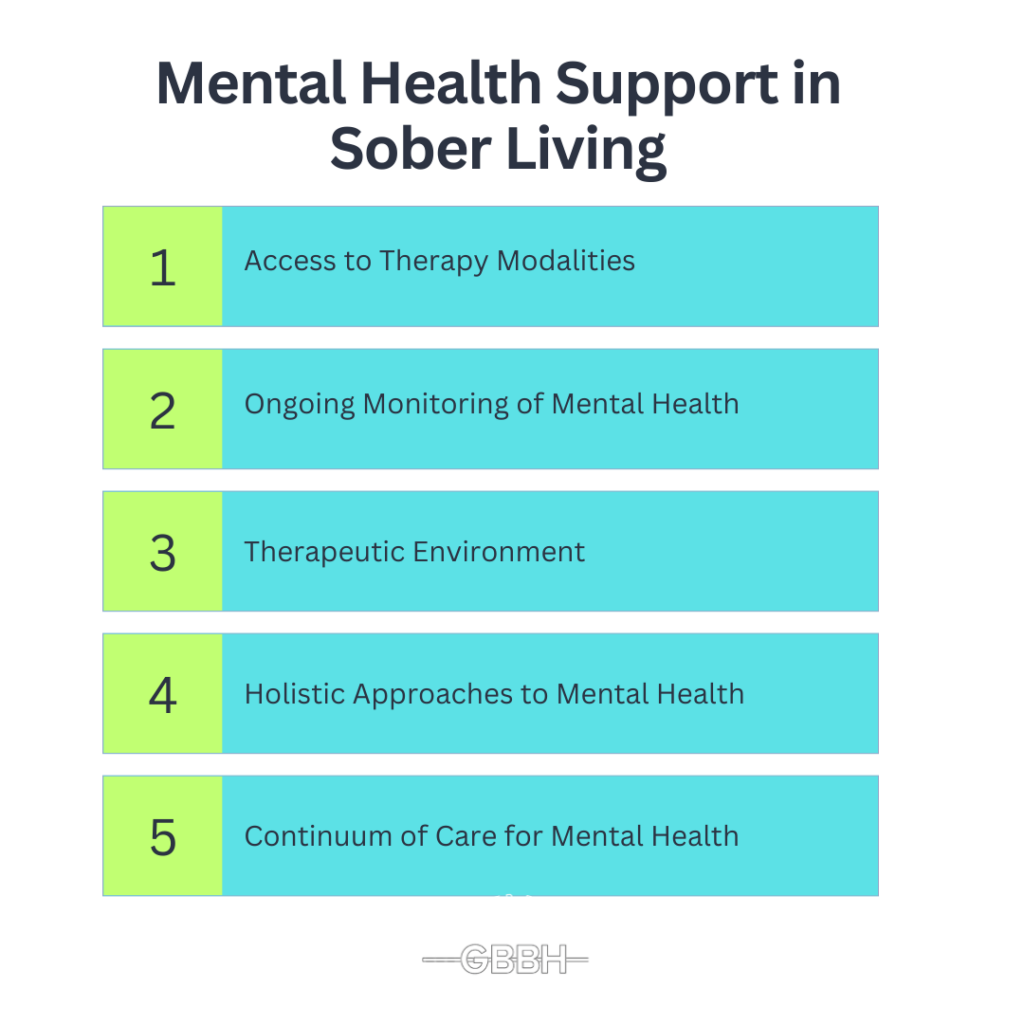Selecting a sober living program is a crucial step on your recovery journey. It offers a structured environment that fosters sobriety while helping you reintegrate into everyday life. At Greater Boston Behavioral Health, we understand that finding the right program tailored to your specific needs can significantly influence your long-term success. Here’s a comprehensive guide to assist you in making an informed decision.
1. Assess Your Needs and Goals
Before exploring options, take time to reflect on your personal needs and recovery goals. Consider factors such as:
- Substance Use History: Identify the substance you are recovering from (alcohol, opioids, stimulants, etc.) and any previous treatment experiences.
- Support Systems: Evaluate your current support network. Do you have family and friends who are supportive of your recovery?
- Personal Preferences: Think about what kind of environment you thrive in. Do you prefer a quiet space or a more social atmosphere?
Understanding your unique situation will help narrow down the most suitable sober living programs.
2. Research Available Programs
Explore various sober living programs in Massachusetts. Look for facilities that provide:
- Mental Health Programs: Programs that address both addiction and underlying mental health issues, such as anxiety and depression, can be highly beneficial for long-term recovery.
- LGBTQ+ Programs: If you identify as LGBTQ+, seek out programs that provide inclusive support tailored to your experiences and challenges.
- Day and Night Treatment Options: Depending on your schedule and needs, you might prefer day treatment programs that allow you to return home in the evenings or night treatment programs that accommodate your work hours.
3. Evaluate Program Structure and Support
Different sober living programs offer varying levels of structure and support. Consider the following aspects:
- Therapeutic Approaches: Look for programs that utilize evidence-based therapies, such as Cognitive-Behavioral Therapy (CBT) and Dialectical Behavior Therapy (DBT). These therapeutic methods help individuals manage emotions, develop coping strategies, and foster healthier behaviors.
- Counseling and Support Groups: Verify whether the program includes individual counseling, group therapy program, or support groups like 12-step programs. Engaging with others who are on similar journeys can provide valuable support and encouragement.
4. Assess the Living Environment
The environment in which you live during recovery can significantly influence your success. When evaluating a facility, consider:
- Comfort and Amenities: Review the accommodations provided. Are the living spaces comfortable, clean, and conducive to recovery?
- Rules and Structure: Understand the house rules and daily structure. A well-defined routine can help establish a sense of stability and accountability.
- Community Atmosphere: Engage with current residents to get a sense of community. A supportive and understanding atmosphere can foster connections that are vital for recovery.
5. Visit the Facility
If possible, schedule a visit to the sober living facility. During your visit, observe:
- Staff Interaction: Pay attention to how staff members interact with residents. Compassionate and supportive staff can greatly enhance your recovery experience.
- Group Dynamics: Observe the interactions among residents. A positive community can provide the motivation and encouragement necessary for recovery.
- Safety and Security: Ensure the facility is secure and promotes a safe environment for recovery.
6. Inquire About Aftercare Services
Recovery is a lifelong journey, and aftercare services can be critical for maintaining sobriety. Ask about:
- Continued Therapy Options: Look for programs that offer ongoing therapy sessions or check-ins to support your transition.
- Relapse Prevention Strategies: Understanding the strategies in place for relapse prevention is crucial for long-term success. Ask how the program prepares you for challenges that may arise post-treatment.
7. Consider Financial Aspects
Finances can be a significant factor in choosing a sober living program. Take the time to review:
- Insurance Coverage: Confirm if your insurance covers the program or if there are payment plans available. Some programs may offer sliding scale fees based on income.
- Cost of Living: Factor in the cost of living in the area. This may affect your overall budget and ability to sustain your recovery after leaving the program.
8. Trust Your Instincts
Ultimately, choosing a sober living program is a personal decision. Trust your instincts and feelings during the selection process. If a program feels right, it likely aligns with your values and needs. Conversely, if something feels off, it’s okay to keep searching for a better fit.
Mental Health Support in Sober Living
When transitioning from addiction treatment to a sober living program, mental health plays a pivotal role in achieving lasting recovery. Sober living environments provide more than just a substance-free space—they offer a comprehensive support system, including mental health services that help individuals maintain emotional stability and resilience. Understanding the significance of mental health support in sober living is essential for anyone looking to sustain long-term sobriety.
1. Integrated Mental Health and Addiction Treatment
Many individuals in recovery from substance use disorders also face underlying mental health challenges. A dual-diagnosis approach, which addresses both mental health and addiction, is critical in sober living programs. Treatment centers integrate mental health treatment programs with addiction services to create a personalized care plan that addresses each individual’s specific needs. Whether it’s anxiety, depression, or trauma, these programs ensure that mental health issues are treated alongside addiction recovery.
2. Access to Therapy Modalities
Therapeutic support is one of the cornerstones of mental health treatment in sober living environments. Residents benefit from access to proven therapies such as Cognitive-Behavioral Therapy (CBT) and Dialectical Behavior Therapy (DBT).
- CBT helps individuals reframe negative thought patterns and replace them with healthier behaviors. This is especially useful for individuals working through anxiety or depression.
- DBT, on the other hand, focuses on emotional regulation, mindfulness, and distress tolerance—crucial skills for managing stress without resorting to substance use.
Additionally, both group and individual therapy sessions are offered regularly, providing a space for personal reflection and shared growth.
3. Ongoing Monitoring of Mental Health
Sober living programs offer consistent mental health monitoring, ensuring that residents receive the care and adjustments needed for their treatment plan. Regular evaluations by mental health professionals allow for timely interventions and adjustments, such as medication management or changes in therapy approaches. If a crisis arises or if relapse seems imminent, immediate support is available to ensure stability and continued progress in recovery.
4. Therapeutic Environment
The sober living environment itself fosters mental health well-being. Residents are provided with a structured routine, including designated times for therapy, self-care activities, and group engagement. These routines encourage stability and help prevent relapse by promoting emotional and mental balance. Moreover, sober living homes create a safe, judgment-free space where individuals can focus on healing without external triggers or stresses.
5. Holistic Approaches to Mental Health
Mental health treatment in sober living is not limited to traditional therapies. Many programs incorporate holistic approaches, such as:
- Physical activities like yoga, fitness routines, and nature walks to boost mental and physical health
- Nutritional support to ensure that diet plays a role in stabilizing mood and energy levels
- Alternative therapies such as meditation, art therapy, and music therapy to provide creative outlets for processing emotions
These activities serve as healthy outlets for stress management and emotional expression, contributing to overall mental health.
6. Continuum of Care for Mental Health
Recovery doesn’t end when someone leaves a sober living program. Many facilities offer a continuum of care that extends support through Night Treatment, Day Treatment, and outpatient mental health programs. This ensures that individuals continue to receive professional help as they transition back to their normal lives. Additionally, long-term care plans are created, emphasizing self-care, coping strategies, and access to ongoing therapy to maintain mental health stability and prevent relapse.
Conclusion
Choosing the right sober living program is a vital step in your recovery journey. By assessing your needs, researching available options, and evaluating therapeutic approaches, you can find a program that aligns with your goals. At Greater Boston Behavioral Health, we offer a range of mental health programs designed to support individuals in their recovery. Contact us or call us today at: (888)278-0716 to learn more about our offerings and how we can help you on your path to lasting recovery.
FAQs on Sober Living Programs
What is a sober living program?
A sober living program provides a structured, supportive environment for individuals in recovery from addiction. It offers a transitional space where residents can continue their journey to sobriety while reintegrating into everyday life.
How do I know if a sober living program is right for me?
If you have completed a rehabilitation program and feel you need continued support before fully returning to independent living, a sober living program may be a good fit. It helps individuals maintain sobriety with accountability and community support.
What types of therapies are offered in sober living programs?
Sober living programs typically offer various therapies, including Cognitive-Behavioral Therapy (CBT), Dialectical Behavior Therapy (DBT), individual counseling, and group therapy. These therapies help individuals manage emotions, develop coping mechanisms, and maintain long-term sobriety.
Can I work or attend school while in a sober living program?
Yes, many sober living programs are designed to accommodate individuals with jobs or educational commitments. Programs often offer flexible scheduling options such as day or night treatment.
Do sober living programs offer support for co-occurring mental health issues?
Yes, many programs provide comprehensive support for individuals with both addiction and mental health conditions. Mental health treatment programs like those that address depression and anxiety, or trauma therapy program can be part of the recovery process.
Are LGBTQ+ programs available in sober living programs?
Yes, some sober living programs offer specialized support for LGBTQ+ individuals, providing a safe and inclusive environment tailored to their unique needs and challenges.
How long do sober living programs typically last?
The length of time in a sober living program varies depending on individual needs. Some may stay for a few months, while others may remain for a year or more. The goal is to stay until you feel ready for independent living.


